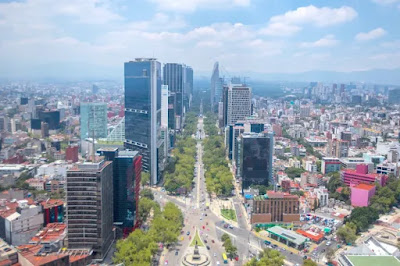MEXICO CITY
Mexico City, also known as Mexico D.F. (Distrito Federal), is the capital city of Mexico and one of the most important financial centers in Latin America.
It is home to the Mexican Stock Exchange, which is the second-largest stock exchange in Latin America after Sao Paulo, Brazil.
In addition to its financial industry, Mexico City is a hub for commerce, culture, and tourism.
The city has a population of over 22 million people, making it one of the largest metropolitan areas in the world.
Its strategic location in the heart of Mexico has made it an important center for trade and commerce for centuries.
Mexico City is well-connected to other major cities in Mexico and the United States, with an international airport that serves as a major hub for air travel in the region.
Mexico City's economy is diverse, with a strong service sector, manufacturing industry, and a growing tech industry.
The city is home to many multinational corporations, including Coca-Cola, Pepsi, and Nestle, and is a major center for the automotive industry in Mexico.
The city has also become an important center for technology and innovation, with several tech startups emerging in recent years.
In addition to its economic importance, Mexico City is a cultural and artistic center.
It has a rich history and cultural heritage, with many museums, galleries, and cultural institutions, including the National Museum of Anthropology and the Palacio de Bellas Artes.
The city also hosts several international events, such as the Mexico City International Book Fair and the Mexico City International Film Festival.
Mexico City is a complex and dynamic city that plays a critical role in Mexico's economy and culture.
While it faces challenges, its strategic location, diverse economy, and cultural richness make it a vital center for business and finance in Latin America.
MONTERREY
Monterrey is a vibrant city located in the northern region of Mexico.
It is the capital of the state of Nuevo León and the third-largest city in the country, with a population of over 5.1 million people.
Monterrey is an industrial and business capital of northern Mexico and is widely recognized for its contributions to the national economy.
The city is also known for its high quality of life, excellent education system, and cultural diversity.
Monterrey is home to several multinational corporations, including Cemex, FEMSA, and Grupo Alfa, among others.
These companies have contributed to the city's economic growth, which has been sustained over the years.
The city has a well-developed infrastructure, including a modern airport, highways, and an extensive public transportation system.
Additionally, Monterrey has a highly skilled workforce, which has attracted foreign investment and allowed the city to become a leader in several industries, including steel production, automotive manufacturing, and logistics.
The city's financial sector has also been growing steadily over the years.
Monterrey is home to several banks, including Banorte, BBVA Bancomer, and Santander, among others.
The city is also the headquarters of the Mexican Stock Exchange's regional offices, which is an important hub for securities trading in northern Mexico.
The presence of these financial institutions has created employment opportunities in the banking and financial services sectors, further fueling the city's growth.
Monterrey's business environment is highly conducive to entrepreneurship and innovation.
The city is home to several universities, including the Monterrey Institute of Technology and Higher Education (ITESM), which is one of the most prestigious universities in Mexico.
These institutions have contributed to the city's well-educated workforce, which has supported the growth of new startups and technology companies.
Additionally, Monterrey has several business incubators and accelerators, which provide support and mentorship to entrepreneurs, helping them bring their ideas to market.
In terms of quality of life, Monterrey offers residents a high standard of living, with excellent healthcare facilities, modern infrastructure, and a diverse cultural scene.
The city has several museums, art galleries, and theaters, which showcase the rich cultural heritage of the region.
Monterrey is surrounded by beautiful natural landscapes, including the stunning Sierra Madre Mountain range, which offers residents opportunities for outdoor recreation.
Monterrey is a thriving city with a robust economy, a growing financial sector, and a highly skilled workforce.
Its business-friendly environment, coupled with its excellent infrastructure and cultural diversity, make it an attractive destination for foreign investment and entrepreneurship.
GUADALAJARA
Guadalajara is the capital of the state of Jalisco and is one of Mexico's leading financial centers.
The city has a growing financial industry, driven by the growth of the technology sector and a favorable business environment.
The city's financial capacity can be analyzed in various aspects, including its economic indicators, infrastructure, and regulatory environment.
The city's economic growth has been driven by its thriving technology sector, which has attracted significant investment in recent years.
Guadalajara is home to many start-ups, tech companies, and multinational corporations, including IBM, Intel, and Oracle.
In terms of infrastructure, Guadalajara has a well-developed transportation system that includes an international airport, several highways, and a modern bus rapid transit system.
The city is also home to several business parks and commercial areas, which provide a conducive environment for businesses to thrive.
The city has a robust telecommunications infrastructure, which supports the growing technology sector and enables businesses to connect with their clients and partners seamlessly.
Guadalajara's regulatory environment is also favorable to businesses, with a streamlined process for business registration and licensing.
The city's government has implemented policies to attract foreign investment and has established programs to support entrepreneurship and innovation.
These policies have made Guadalajara an attractive destination for businesses looking to expand into the Mexican market.
TIJUANA
Tijuana is a border city in northern Mexico, located just across the border from San Diego, California, in the United States.
It is an important center for trade and commerce, and it has a growing financial sector.
One of the key factors driving Tijuana's financial capacity is its strategic location.
As a border city, Tijuana is an important gateway between Mexico and the United States.
This has led to the development of a large and dynamic trade and manufacturing sector, which has helped to fuel the city's economic growth.
Tijuana is also home to a number of financial institutions, including banks, investment firms, and insurance companies.
These institutions provide a range of financial services to businesses and individuals in the region, including loans, investments, and insurance products.
In recent years, Tijuana has seen significant growth in its financial sector, driven in part by government policies aimed at promoting economic development in the region.
For example, the Mexican government has established a special economic zone in Tijuana, which provides tax breaks and other incentives to businesses operating in the area.
Tijuana has a growing startup ecosystem, with a number of technology and innovation-focused companies operating in the city.
This has helped to drive growth in the city's financial sector, as these companies require access to capital and other financial services to grow and expand.
Tijuana's financial capacity is driven by a combination of factors, including its strategic location, its large and dynamic trade and manufacturing sector, and the growth of its financial institutions and startup ecosystem.
As the city continues to develop and evolve, it is likely that its financial sector will continue to grow and become an increasingly important part of the Mexican economy.
QUERÉTARO
Querétaro is a growing financial center located in central Mexico.
The city's financial capacity is evident in its strong economic growth, which has been driven by a combination of factors such as a favorable business environment, a skilled workforce, and a growing population.
These factors have led to the development of a thriving financial sector that contributes significantly to the city's overall economic output.
Querétaro's impressive financial capacity comes from its's position as a hub for industrial and business activities.
The city has attracted many multinational corporations, including Bombardier Aerospace and General Electric, which have established their operations in the city.
This has created numerous job opportunities for the local workforce, resulting in an increase in disposable income and consumer spending.
This, in turn, has fueled the growth of the financial sector, which has provided essential financial services to businesses and individuals in the region.
Querétaro's financial sector is also characterized by a high concentration of banks and financial services providers.
The city has several national and international banks, including BBVA Bancomer, Santander, and Banorte, among others.
These institutions provide a wide range of financial products and services, including loans, credit lines, investment products, and insurance, among others.
They have played a significant role in supporting the growth of small and medium-sized businesses in the region, providing them with the necessary financing to expand and grow.
The city has a business-friendly climate characterized by low taxes, streamlined regulatory processes, and incentives for investment.
This has attracted many investors, both local and foreign, who have set up businesses in the region.
These businesses have, in turn, created jobs, stimulated economic activity, and contributed to the growth of the financial sector.
Querétaro's financial capacity is driven by a combination of factors, including its position as a hub for industrial and business activities, a concentration of banks and financial services providers, and a favorable business environment.
These factors have created a thriving financial sector that plays a critical role in the city's economic development.
In conclusion, Mexico's leading financial cities offer a diverse and dynamic financial landscape that provides businesses and individuals with essential financial services and support.
Mexico City, Monterrey, Guadalajara, Tijuana, and Querétaro are all hubs for industry and business activities, characterized by favorable business environments, skilled workforces, and growing populations.
These cities have attracted many national and international investors, who have set up businesses and created job opportunities, driving economic growth and stimulating the growth of their financial sectors.
As Mexico continues to develop and modernize, these cities will remain at the forefront of the country's financial landscape, providing businesses and individuals with the support and services they need to succeed in today's global economy.






















